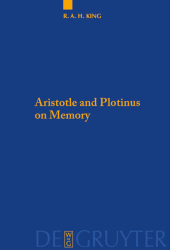 Neuerscheinungen 2016Stand: 2020-02-01 |
Schnellsuche
ISBN/Stichwort/Autor
|
Herderstraße 10
10625 Berlin
Tel.: 030 315 714 16
Fax 030 315 714 14
info@buchspektrum.de |

Richard A.H. King
Aristotle and Plotinus on Memory
2016. XIV, 266 S. 230 mm
Verlag/Jahr: DE GRUYTER 2016
ISBN: 3-11-048155-3 (3110481553)
Neue ISBN: 978-3-11-048155-6 (9783110481556)
Preis und Lieferzeit: Bitte klicken
In der 1970 gegründeten Reihe erscheinen Arbeiten, die philosophiehistorische Studien mit einem systematischen Ansatz oder systematische Studien mit philosophiehistorischen Rekonstruktionen verbinden. Neben deutschsprachigen werden auch englischsprachige Monographien veröffentlicht.
Gründungsherausgeber sind: Erhard Scheibe (Herausgeber bis 1991), Günther Patzig (bis 1999) und Wolfgang Wieland (bis 2003). Von 1990 bis 2007 wurde die Reihe von Jürgen Mittelstraß mitherausgegeben.
The series, founded in 1970, publishes works which either combine studies in the history of philosophy with a systematic approach or bring together systematic studies with reconstructions from the history of philosophy. Monographs are published in English as well as in German. The founding editors are Erhard Scheibe (editor until 1991), Günther Patzig (until 1999) and Wolfgang Wieland (until 2003). From 1990 to 2007, the series had been co-edited by Jürgen Mittelstraß.
Two treatises on memory which have come down to us from antiquity are Aristotle´s "On memory and recollection" and Plotinus´ "On perception and memory" (IV 6); the latter also wrote at length about memory in his "Problems connected with the soul" (IV 3-4, esp. 3.25-4.6). In both authors memory is treated as a ´modest´ faculty: both authors assume the existence of a persistent subject to whom memory belongs; and basic cognitive capacities are assumed on which memory depends. In particular, both theories use phantasia (representation) to explain memory.Aristotle takes representations to be changes in concrete living things which arise from actual perception. To be connected to the original perception the representation has to be taken as a (kind of) copy of the original experience this is the way Aristotle defines memory at the end of his investigation.Plotinus does not define memory: he is concerned with the question of what remembers. This is of course the soul, which goes through different stages of incarnation and disincarnation. Since the disembodied soul can remember, so he does not have Aristotle´s resources for explaining the continued presence of representations as changes in the concrete thing. Instead, he thinks that when acquiring a memory we acquire a capacity in respect of the object of the memory, namely to make it present at a later time.
Richard A. H. King, University of Glasgow, UK.


